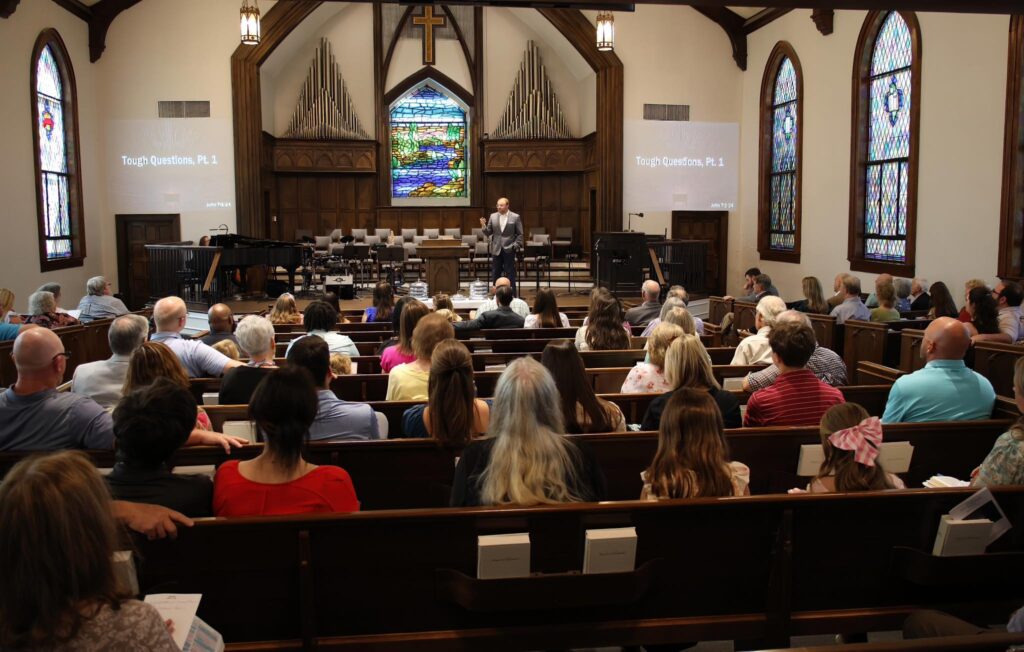Father and son Mississippi pastors celebrate benefits of CP
Editor’s note: October is Cooperative Program Emphasis Month in the SBC.
MADISON, Miss. (BP) — Chip and Reid Stevens were driving back to the afternoon session of the Mississippi Baptist Convention’s annual meeting on Oct. 28 when they were asked about the Cooperative Program. Responses gelled around the concepts of connection and action.
First Baptist in Jackson, where Chip is pastor, gave 9.1 percent through CP for 24-25. He said the priority begins with education.

“We do a lot of things with the International Mission Board and North American Mission Board emphases,” he said. “We’ll bring in missionaries on a regular basis and everyone learns how the Cooperative Program helps their work. We’ve been doing that for a long time, and of course, we have RAs and GAs. We have two missionary houses at First Jackson that we own and there is always a flow of missionaries coming through. We teach children at an early age about CP.”
Chip’s son Reid serves as pastor of Forest Baptist Church, which gives 10 percent through CP.
“We use two primary ways – storytelling and through prayer,” he said. “Storytelling is pretty similar to what dad said. Anytime we have the opportunity, we put a boots-on-the-ground person in front of our people, whether it’s a seminary professor, entity president, missionary or church planter for different connections and relationships in our church. We love to tell those stories and let people know they are a part of what God is doing not just here, but throughout the world.”
The church’s weekly emailed prayer list includes requests for a NAMB church planter and IMB unreached people group.
“We want to pursue a mental framework for prayer that pushes us beyond the walls of our church and let them know our contributions play a part in that,” Reid said.
CP also helps in making disciples in “a very practical, tangible way.”

“We partner with our local association [through CP], and it’s a law of reality that we can do and accomplish more together than we can ourselves,” said Reid.
“Forest Baptist Church is not going to be able to spread the Gospel in Cambodia and India and certain places of the world as easily as we can through resourcing individuals who are called to particular places at particular times. It’s the collective and collaborative aspects of the Cooperative Program that help us be a part of those things.”
“[Financial] gifts are spread out so many different ways,” said Chip. “You accomplish so much with one gift through missions, theological education, the ERLC — all the things CP supports.
“There is also a trust factor. Things are vetted through the trustee system. When we have someone at First Jackson who feels called to missions, we want them to go through NAMB or the IMB because of how well [Southern Baptists] take care of our people. So, it’s just a really good investment.”
As both have earned degrees at New Orleans Baptist Theological Seminary (Reid is also working on his Ph.D.), they have benefited from others’ CP support. Forest Baptist’s youth pastor is also currently attending NOBTS.
“Those CP dollars help pay his tuition, but it also is a supplement for our church, because we don’t have to help him carry that burden as much,” said Reid.
Chip said placing a name and face to the gifts, as they do, makes a difference in how people become eager to give.
“Our WMU does a great job of constantly communicating to our people about the importance of missions. Every year on the first weekend in December, we have a big international missions celebration with many missionaries coming in to speak. We get to hear how God is working through them, and how we are a part of it through our CP support.”
Reid noted Forest Baptist’s longtime support of Graffiti 2, a NAMB church plant in the Bronx. The 20-year relationship has led Forest Baptist members to serve on Graffiti’s board and work very closely with leadership.
“It’s been really impactful for our people,” he said. “That’s not just for the people who go there every year and help. We’re connected with them constantly, helping in various ways. It’s a relationship that is sustained year-round.”